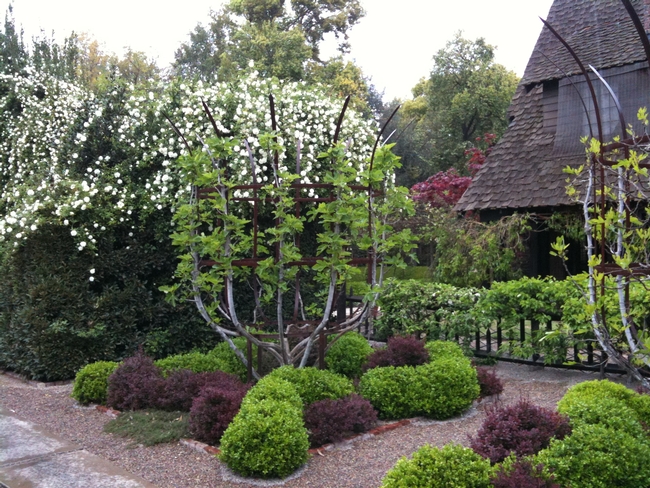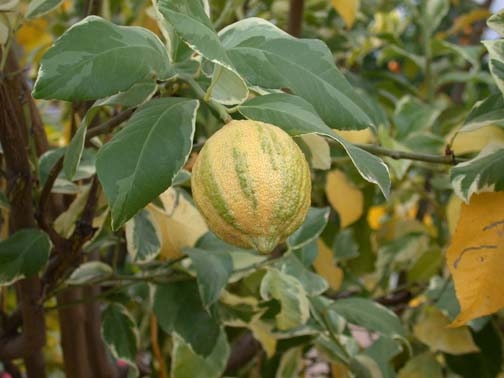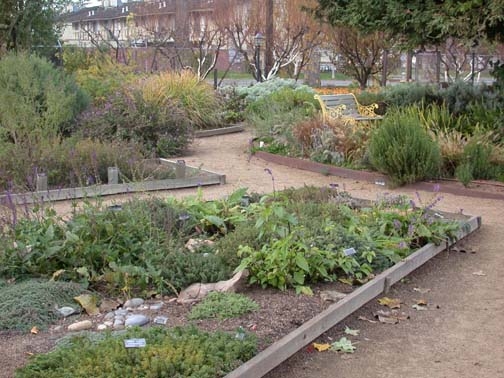Landscaping? Think edibles
What do Santa Rosa Weeping flowering plum, persimmon, variegated lemon and Tiger figs all have in common? They are all fantastic ornamental plants that produce wonderful edible fruit. There are a variety of fruits and vegetables that can be incorporated into your landscape that produce food for you, your family and your neighborhood. Every landscape should have edibles in it, particularly in light of our goals to produce food closer to home, to conserve water and make the water we do use count for more than irrigating a lawn that nobody ever plays on. Growing your own food feels good and is good for you and your community!
Some simple ideas for incorporating edibles into your landscape are to include fruit as part of your landscape plantings. You might consider an espalier of apples or pears along your western fence; plant an dwarf orange tree on a south facing wall as a large shrub. If you
are in the right climate zone, a dwarf lime or lemon tree is always a hit. A varigated lemon adds interest because the fruit and the foliage are varigated but the flavor is the same as a traditional Eureka Lemon. Limes are also useful in a lot of recipes and it is nice to have one just outside your door for that gin and tonic. Fuyu persimmons make wonderful shade trees that are easy to grow, have few pests and the fruit is tasty eaten fresh or dried. Just don’t plant them over a driveway or patio since the fruit drop in fall may be a bit annoying.Shrubs with edible fruit are great too. Blueberries are lovely garden plants and you will be able to harvest quite a bit of fruit off of one or two plants. You could also plant a compact Stella Cherry (a self-pollenating variety) as a flowering deciduous shrub that will grow to about 10 feet tall but can be kept shorter with summer pruning. You can also grow a variety of citrus as super dwarf plants if they are grown on Flying Dragon Rootstock, which keeps their height to below 6 feet without a lot of pruning.
The area that you can save a lot of money is by putting in an herb garden. The basic plants that every herb garden should have are thyme, chives, rosemary, tarragon, sage, oregano, and an annual planting of basil in the spring and dill in the late summer/fall. While there are a wide variety of herbs that you may want to grow, these few are the most commonly used to season our foods. If you purchase fresh herbs from the grocery story, a small plastic wrapped package with a few sprigs of thyme costs about $2.99. This stuff will grow in lower elevation gardens without difficulty. One plant may cost $2.99 but once established, will provide all the thyme you could use for as long as you have it in the garden.
The key to edible landscaping is to change your ideas of what a landscape can be. Edibles don’t have to be grown in rows or in an area designated as the “vegetable garden." They can be incorporated into your flower beds as part of the ornamental garden. Compact, that is "determinant," tomato varieties that don’t require staking are perfect for sunny beds. If you have room for a ground cover in a sunny area, think of strawberries. If you want to cover a trellis or arbor, grapes can be good but only plant varieties listed as resistant to powdery mildew. Black Monukka is a nice seedless variety that has a medium-sized berry and is relatively pest and disease resistant. Consider that even if you don’t harvest everything yourself, you will have some food that you can share with your neighbors and friends.
For more information on how do grow edibles in your landscape, contact your local Master Gardeners. You can find them on the California Master Gardeners' websites.

ripe plums





Posted by mirageland on July 29, 2017 at 3:46 AM